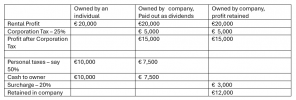Brendan Burgess
Founder
- Messages
- 52,192
I am not a tax expert, so corrections welcome. Some of the figures have been deliberately simplified e.g. 50% for personal taxes.
This comes up a lot in various formats so I thought I would update the Key Post on the topic.
This post is about an Irish individual investor who wants to buy residential investment property in Ireland and thinks that they might do it through a company.
This does not cover:
This comes up a lot in various formats so I thought I would update the Key Post on the topic.
This post is about an Irish individual investor who wants to buy residential investment property in Ireland and thinks that they might do it through a company.
This does not cover:
- Property development
- A business operating through a company which wants to buy its own premises
- An existing company which has built up a big cash pile and wants to buy a property
- Buying a property through a pension fund
- Buying overseas property
Last edited:

